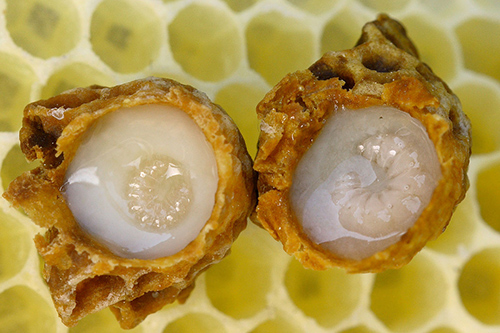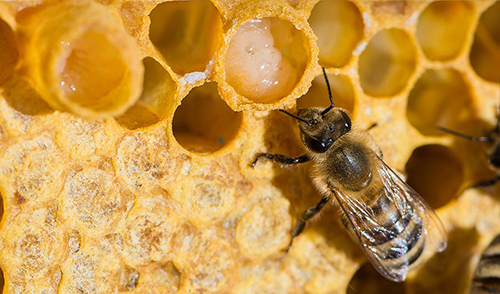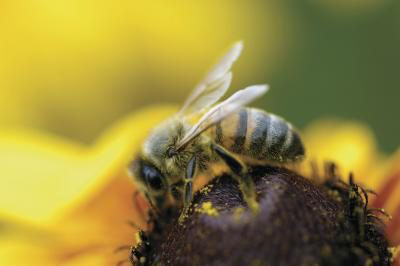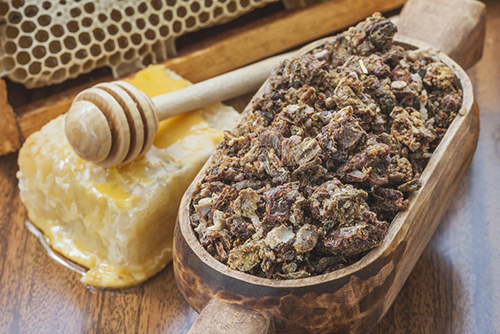Contents

Royal jelly benefits: Royal jelly is a creamy whitish fluid that worker bees secrete from their hypopharyngeal glands. It is designed to feed:
- Larvae of all bees during the first three days of life and
- The larvae of those bees are destined to be queens their entire lives.
Thanks to royal jelly, queens attain more significant body development and live 3 to 4 years (workers live 45 to 50 days).
Royal Jelly Composition

The composition of royal jelly is very similar to pollen but less concentrated (68% water). Its salient feature is its protein content (12%) of high biological value, rich in amino acids generally missing in other foods, such as lysine and cystine.
Many have tried to isolate the substance in royal jelly from antiquity that converts a larva into a queen. This feat has not yet been accomplished. However, we do know that royal jelly contains protein substances that act in the human body to stimulate:
- The function of endocrine glands, particularly the suprarenal gland, the ovaries, and the testicles;
- The immune system and the production of antibodies;
- The creation of collagen and the repair of injured tissue.
Top Four Royal Jelly Benefits
Although some have idealized and exaggerated its effects, there seems to be evidence confirming that it does possess nutritive and stimulating effects. It also stimulates the hormonal and immune systems and improves blood flow to the body’s tissues. It is helpful in the following cases:

- As a tonic in asthenia, depression, stress, nervousness, physical and mental exhaustion, and memory loss.
- Sexual impotence in males and lowered libido in both sexes; therefore, royal jelly benefits for female fertility and royal jelly benefits for male impotence have been proven.
- Arteriosclerosis, coronary disease, high blood pressure; lower cholesterol level, dilates the arteries, improves blood flow.
- Immunodeficiency due to lowered resistance, abuse of antibiotics, chronic infectious diseases, flu, and repeated colds.
Since gastric juices can deactivate some of the royal jelly’s proteins, it should be taken in capsule form. The typical dose is 2 to 4 g daily during a month and may be repeated three or four times a year.
Bee Propolis Benefits
Propolis is a viscous substance made by bees using:
- Their secretions, mixed with
- Resin and sap from various trees, mainly pines and other conifers, birch, and ash.
A typical beehive produces between 150 and 300 grams of propolis a year. The bees use it as:
- A construction material to repair damage to the hive and to varnish its interior.
- An antiseptic due to its ability to destroy fungi, bacteria, and viruses.
Bee Propolis Benefits: Composition
- Resins: 55%
- Waxes: 25%
- Essential oils: 10%
- Pollen: 5%
- Flavonoids, vitamins, organic acids, and minerals: 5%
What is Propolis Used For?
Bee propolis benefits is helpful for humans as well as bees. It is a natural antibiotic: many of the component substances of propolis arrest the growth of various bacteria, such as staphylococcus, streptococcus, salmonella, and various bacteria that cause intestinal infections.

- It is as effective topically on the skin or mucosa as oral.
- It does not depress the body’s immunity, like other antibiotics, but instead stimulates the immune system.
- It is particularly recommended for respiratory (pharyngitis, bronchitis) or digestive (gastroenteritis, colitis) infections.
Virucide: Propolis is active against flu and herpes viruses. Its effect on other viruses, such as AIDS, is under investigation.
Fungicide: It impedes the growth of various microscopic fungi that affect the skin and mucosa, such as Candida albicans. In these cases, it is applied topically as an ointment or other preparations.
Emollient and antitussive: Protects and reduces inflammation of the respiratory system. It is recommended for upper respiratory infections (pharyngitis, laryngitis, sinusitis, etc.), bronchitis, and cough from various causes.
Anti-inflammatory and antirheumatic.
Local anesthetic: It is used for dental pain by applying a drop of tincture to the affected area.
The average dose by mouth to take full advantage of bee propolis benefits is 300 to 500 mg two to three times daily, in any of these forms:
- Syrup or tincture,
- Chewing gum,
- Capsules,
- Ointments or other dermatological preparations.
DISCLAIMER: All content on this website is presented solely for educational and informational objectives. You should not rely on the information provided as a replacement for advice, diagnosis, or treatment from a qualified medical expert. If you are pregnant, nursing, or have any preexisting medical concerns, you should talk to your doctor before using any herbal or natural medicines.
REFERENCES
- George D. Pamplona-Roger, M.D. “Encyclopedia of Foods and Their Healing Power.” George D. Pamplona-Roger, M.D. Encyclopedia of Foods and Their Healing Power. Trans. Annette Melgosa. Vol. 1. Chai Wan: Editorial Safeliz, 2005. 360, 361. Print. [royal jelly benefits], [bee propolis benefits]
- Royal Jelly: Overview, Uses, Side Effects, Precautions, Interactions, Dosing and Reviews: https://www.webmd.com/diet/royal-jelly-good-for-you
- New Insights into the Biological and Pharmaceutical Properties of Royal Jelly: https://www.ncbi.nlm.nih.gov/pmc/articles/PMC7014095/
- Honey, Propolis, and Royal Jelly: A Comprehensive Review of Their Biological Actions and Health Benefits: https://www.ncbi.nlm.nih.gov/pmc/articles/PMC6802361/
